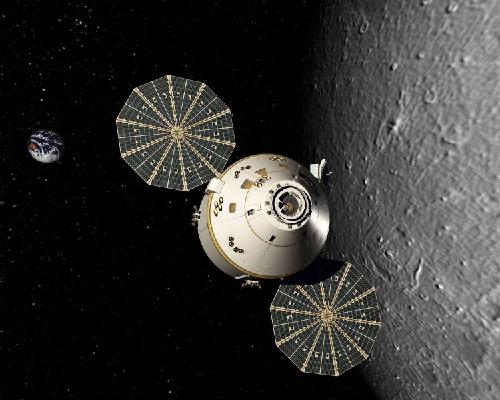| < | Wavepacket Blog only displaying 'economics' posts |
> |
| << Newer entries << | |
| 2010 | |
| May | |
| Fri May 21 23:30:08 2010 Space Plan |
|
| Mon May 17 21:31:39 2010 A Modest Proposal |
|
| Tue May 11 20:59:49 2010 Greece's Surrender |
|
| >> Older entries >> | |
| >> links >> | |
| Fri May 21 23:30:08 2010 Space Plan Now I have even more respect for the new NASA direction. |
|||||||
| A friend of mine is the Astronomy columnist for the
Seattle Examiner. If you are interested in Astronomy in the Seattle area, you should definitely read
his articles!
He recently posted an article about former NASA administrator Michael Griffin's talk at the Boeing Museum of Flight, in which Griffin wasn't entirely supportive of the new NASA direction. In particular,
Harsh! Griffin called the new direction "Obama's proposals", although most of them came from the so-called Augustine Report, the outcome of the Review of US Human Spaceflight Plans Committee. You can find the Augustine Report here, which is very readable! If you are at all interested in the US space program I recommend flipping through it. It is over 150 pages (ack) but I read through the Introduction (Chapter 1), the coverage of current programs (Chapter 4), and their evaluation of critical technologies (Chapter 7). It is a pretty interesting report! Popular Mechanics has an online article about 5 Surprising Passages from the Full Augustine Report. [If you flip through the report, on page 12 you'll find an awesome diagram showing the International Space Station, color-coded by which country supplied the components. It is clear that the ISS is almost exclusively a US and Russian venture, although Japan kicked ass (far above the European contributions). Although, before I deride Europe too much, I should given them the benefit of the doubt--they may have recognized early on that the ISS was a colossal waste of money.] Michael Griffin also didn't like the Augustine Report "which he feels got some things right but blew many others." Many astronauts also don't like the new direction. Neil Armstrong and Eugene Cernan, the first and last astronauts on the moon, testified to the Senate that
Ouch! However, not all astronauts agree with them. For instance, Russell Schweickart recently wrote that the new direction was a much-needed change. Schweickart noted
And of course, my own blog posts ( No Moon and Moon Shot ) significantly elevated the national debate. Recently The Space Review ran a series on the new direction (see part 1 and part 2 ). The review is somewhat politically-heavy (for instance, worrying that a more efficient NASA will mean less pork to keep congress happy) but basically calls out the main differences of Obama's plan:
Obama's plan is good about separating the many phases of launching people and material into orbit. For instance, both the Shuttle and the Constellation programs have the same problem: they use the same vehicles for people and cargo. This is very expensive, since any manned vehicle has huge overhead for safety! Separating the two (launching people and cargo using different vehicles) is much cheaper and may be more reliable--and safer. Also, Obama's plan puts more funding into private space companies for launches into low earth orbit. This wasn't a viable option ten or twenty years ago, but it is now. And it means that we'll build out our private launch industries, let them spread the risk and try out new technologies, and let NASA focus on other issues such as deep-space propulsion and life support. Much better! So I understand why many people aren't happy about he change in direction. And certainly Michael Griffin is worried about his legacy. But the new NASA direction looks better and better the more I look at it. Comments |
Related: > economics < science Unrelated: books energy environment geopolitics lists mathematics predictions |
||||||
| Mon May 17 21:31:39 2010 A Modest Proposal One way to fix, or at least alleviate, the mortgage crisis. |
|||||||
Today there was news that
people are dropping out of mortgage assistance programs. Some of that article was a bit troubling, such as this quote from one person
who did finally get assistance. This is how she saw the banks behaving:
I wouldn't be surprised if many banks dragged their feet. Why would they give up the chance of an income stream? Even with government assistance, banks don't have much financial motivation to make the program successful. Anytime you have a program that is counter to important participants' self-interest, it is usually doomed to fail, no matter how well-intentioned. Some underwater homeowners are getting a permanent modification to their mortgage. But many others are being forced to foreclose or make a short sale. So how about if we had a mortgage assistance program that was actually in everyone's best interest? The best idea I've been able to come up with would be to have banks receive an equity share in the home. For instance, if your mortgage was 20% more than the house was worth, instead of having you just walk away, the bank would take a 20% equity stake. You could keep paying back the mortgage for what you owed. Later, when you sold, the bank would take a 20% cut of the sale. Another problem is people who took out mortgages that are too big. Those homeowners are now facing mortgage payments that they can't pay. One option may be to have the bank adjust the principal down in return for an equity stake. This could be a good option for many homeowners since they would still have a lot of equity in what should remain an appreciating asset. And for banks, they have a chance to recoup some of their losses later as homeowners sell. I think this plan should require that the banks allow people to buy them out, so people would have the option to buy back their equity at any time. Obviously, with a sizeable long-term equity stake, a bank will be sensitive to what a homeowner does with the home. For instance, what sorts of renovations are made, and how the house is kept up. But banks already care about that! If you have mortgage, then there are already restrictions on what you can do with the home. I don't think this would fix everything, but I think that in some situations both banks and homeowners may be interested. Comments |
Related: > economics < Unrelated: books energy environment geopolitics lists mathematics predictions science |
||||||
| Tue May 11 20:59:49 2010 Greece's Surrender The European Union brings the hammer down. |
|||||||
| Just Sunday I blogged about
Sovereign Bankruptcies. I was mostly worried about the United States, but lately
Greece has been stealing the headlines due to its imminent bankruptcy instead.
On Monday the European Union announced it was going to bail out Greece with a $1 trillion stabilization package, which is, to quote the article, "shock and awe." Markets rebounded on the news after last week's slides, but were a little less enthusiastic today. People are worried, rightly, that bailing out Greece with more loans could ultimately make the problem worse. But today Slate had a great article about the EU bailout. One of my favorite quotes, referring to Greece's end of the deal:
Basically, Greece had to agree to a long list of deep structural changes which their parliament must enact over the next several years, with some deadlines in June 2010! Overall, I think this is a good thing. The European Union made it clear it will protect its own, but also imposed serious changes on how Greece does business (including making it easier for Greeks to do business!). One scary sidenote: central banks are realizing that an important component of bailouts is the size. They feel like they need to put a lot of money on the table to calm markets. Obviously, that can't keep escalating like it has. Which means the next bailout may already be doomed--no one will have the money to trump the EU's $1 trillion package. So again, it all comes down to not spending more than you have. Comments |
Related: > economics < Unrelated: books energy environment geopolitics lists mathematics predictions science |
||||||
| Links: |  |
Blog Directory | Blog Blog | Technorati Profile | Strange Attractor |




